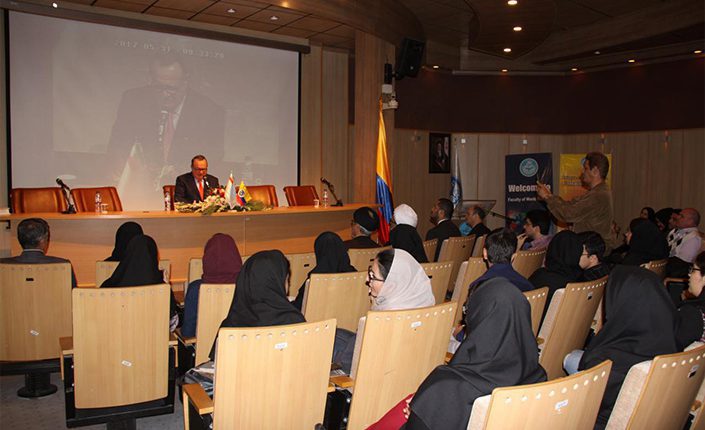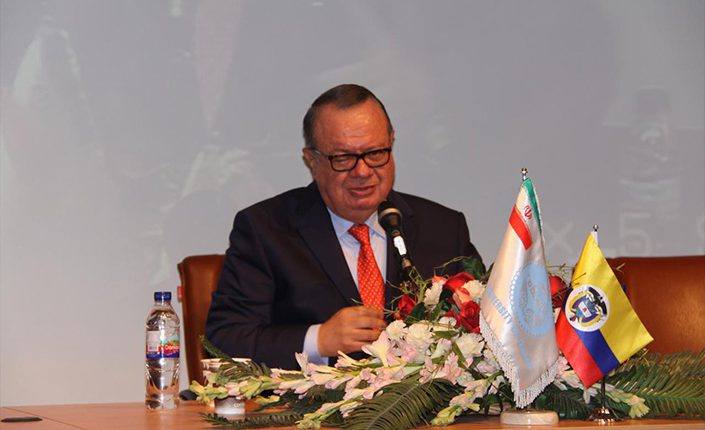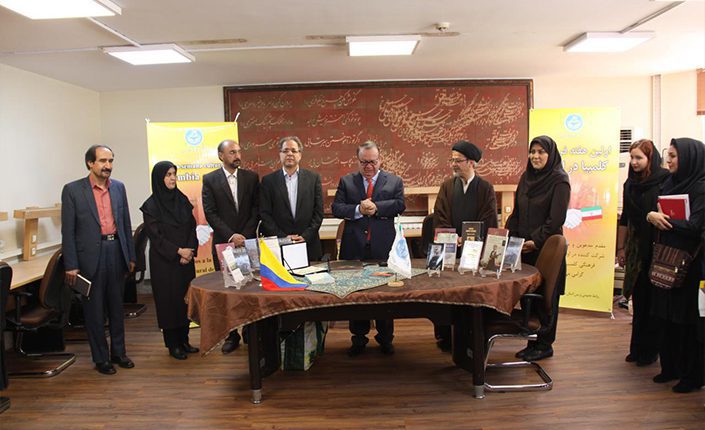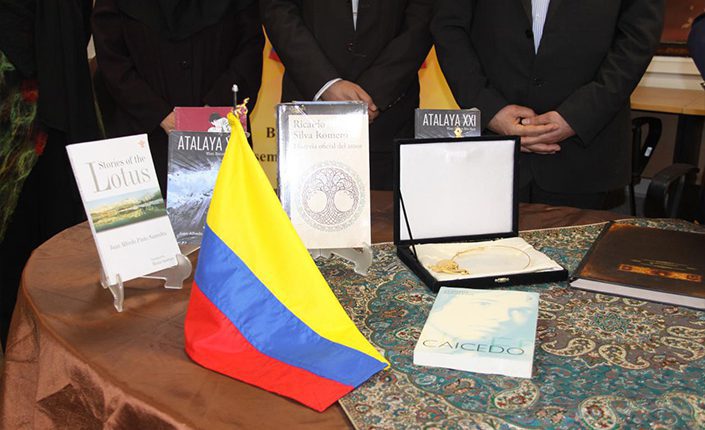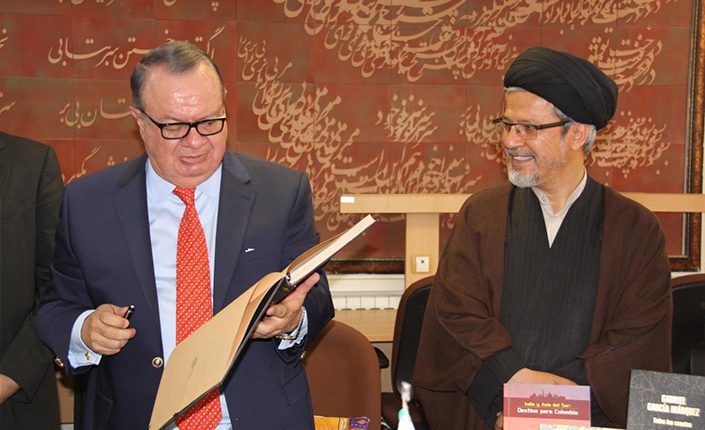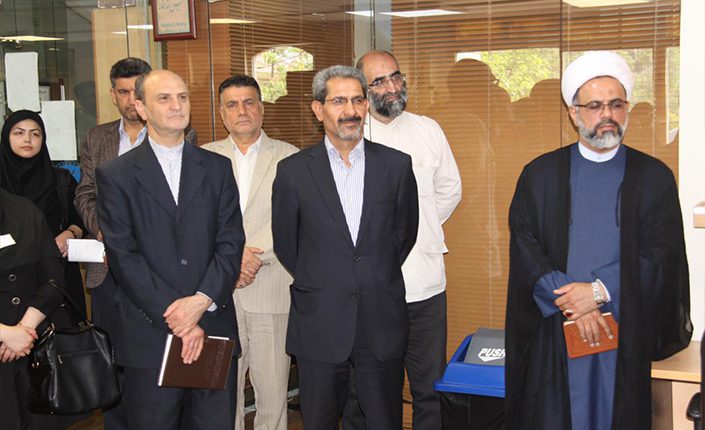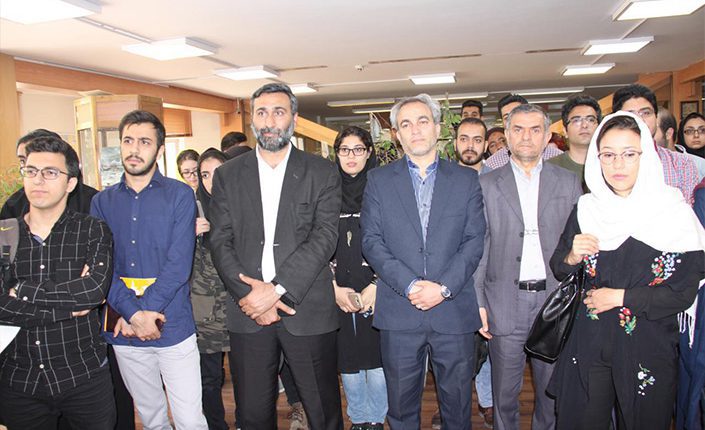The first cultural week of Colombia in Iran was held on Monday, May 01, 2017, in Hananeh Hall of the Faculty of World Studies. Colombian Ambassador and professors, students, and officials of the Faculty attended the ceremony.
Dr. Saeid Reza Ameli, Dean of the Faculty, greeted the attendees in the opening ceremony. He welcomed the Colombian Ambassador and offered his gratitude to Dr. Maryam Haghrusta, Director of Latin American Studies at the Faculty. He also appreciated all the students of the Faculty who had assisted in organizing the program.
He began his speech by saying that, “The first point that I want to address in the inauguration of the cultural week of Colombia is that, to understand a country, a nation, a civilization, and a society, perhaps politics is not the right channel. There are lots of misperceptions and misrepresentations in the area of politics because politics has good days and bad days. Politics is a temporary phenomenon, sometimes you have a very good president, sometimes you have a bad president. But culture and civilization are very continuous, very historical, they have deep roots in history. So, perhaps, to understand the right picture of one country, we need to understand a culture, a civilization of society.”
“There is fake culture, hype culture, and mainstream culture. Fake culture does not necessarily represent the whole culture of one society. To understand the whole culture of one society, we really need to go to the details of the historical phenomena. I’m sure all of you agree with this idea that Colombia did not start in the 18th century or 17th century by Cristopher Columbus. It has a very long background, ten thousand years of history and civilization in Latin Americ. So, if we want to understand a proper picture of Colombia, perhaps we need to go a bit back to the history and see what happened ten thousand years ago throughout the history until today,” he continued.
Professor Ameli said, “I understand that we share many things with the Latin American culture. I’ve never been in the Latin American society, any of the countries of the Latin America, but I was in the US and we had a lot of Spanish people there and we had a very good relationship with the Spanish community. I understand that Latin America is a very family-oriented society. Here, in Iran, we really appreciate family and we try to be family-oriented. Spanish culture all around Latin America is a very warm culture and I can see the warm culture among the students of Latin American studies. It’s very different from other students of the Faculty of World Studies. So the culture is transferred by the study, by the program, by the educational program as well. We share the culture of sports – football – with Colombia. We share the same culture of food. We may also share some similar experiences in our conflicts with the superpowers.”
“Although, culturally speaking, we share many things, we have our differences. Difference is a sign of diversity. Without differences, we cannot understand diversity and diversity is very appreciated. We need to be together, make each other happy, and be happy for our happiness, for others’ happiness. If I’m happy with your happiness, then it is generated in the whole society and we can experience a happy society all over the world. The problem is where people try to transfer the hate to others and hate is the culture of evil. It’s fake culture, a culture of demonization, a culture of discrimination, a culture of oppression of others. We don’t want to look for negative culture, we’re looking for positive culture and I think we have to learn how to be together while we are different. That is the point that makes life very proud and very happy and very peaceful. The key is conflict resolution. The key is how we can tolerate each other. The key is we can find some area of similarity, togetherness, and happiness; to be together. I think all of us, as humans, when we see the smile of children, kids, young, or old people, it makes us happy. This means that, originally, human society appreciates peace and happiness of others,” he added.
“I really believe that the area of civilization is an area of peace and happiness and proudness and beauty. Civilization cannot be a civilization unless it becomes a source of happiness. It I born out of proudness, happiness, respect for others, and dignity. Civilization is not based on war. War cannot make civilizations. Unfortunately, those who benefit from war, they usually create hate in the society to have the war. Otherwise, hate cannot come to the life of the people naturally. Natural culture is the culture of support for each other, peace, and togetherness. When you see hate and mass hate anywhere- if we can see the mass hate in the society, don’t trust the area, there is something beyond that. There is some agenda beyond the mass hate, and that agenda is business agenda, for making money through hate and war,” Dr. Ameli said.
“While, especially at university, in the culture of university, in the policy of the university, in the public diplomacy of science and university, the main principle is understanding others and respect for others and trying to have an exchange position with others, I hope these three days to be three days of the beauty of Colombia, culture of Colombia, civilization of Colombia, and understanding Colombia from the deep,” he concluded.
The next speaker was Juan Alfredo Pinto Saavedra, Colombian Ambassador, who began his speech by talking about his scientific background. “Although many imagine Colombia to be full of drug lords and dealers, there are a lot of people in the country who have academic education and are active in official businesses like the people of the other countries,” he said.
Colombian Ambassador continued his speech by speaking about the civilization, culture, and art of Colombia and mentioned the country’s breathtaking nature. He also highlighted the influence of Amazon on Colombia’s culture and literature by referring to the works of Gabriel García Márquez and Fernando Botero.
The ambassador appreciated the program and asserted the role of culture and art in promoting Iran-Colombia relations. He argued that these programs will facilitate and improve the relationships between the two countries.
Colombia Ambassador dedicated a complete, priceless series of Gabriel García Márquez’s books, a series of literary and fictional texts by Colombian writers, and a copy of his own book in English and Spanish to the library of the Faculty of World Studies. He also dedicated some Colombian pieces of art to the Nations’ Museum.
An exhibition of photos of Colombian nature and wildlife is held at the Faculty’s lobby for three days. The exhibition was inaugurated by the Ambassador and the FWS’ officials on Monday.
The first cultural week of Colombia in Iran will continue for three days, until Wednesday, at the Faculty of World Studies. The Colombian Ambassador will be at the Faculty during the week.



